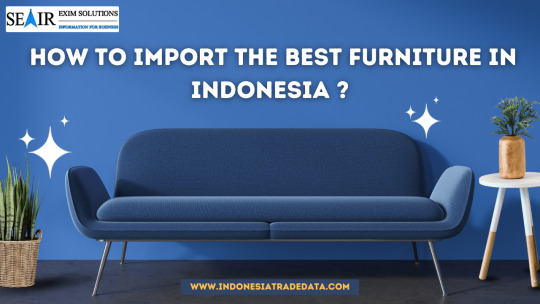#FurnitureImportData
Explore tagged Tumblr posts
Text
How to Import Furniture from Indonesia: Key Insights, Steps, and Statistics
Importing furniture from Indonesia presents a lucrative business opportunity due to the country's reputation for high-quality craftsmanship and reasonable prices. Whether you are a seasoned importer or new to the trade, understanding Indonesia's furniture import data, key steps, required documents, and the applicable HS codes is crucial for a smooth and successful importing experience. In this article, we will cover everything you need to know, from market research to finding reputable suppliers, so you can confidently import furniture from Indonesia.

Overview of Indonesia’s Furniture Import Market
Indonesia is a significant player in the global furniture trade, known for its high-quality craftsmanship, especially in outdoor and teak furniture. Based on data from March 2023 to February 2024, 10,757 shipments of furniture were imported globally from Indonesia, marking a 2% year-over-year increase. This growth highlights Indonesia’s strong presence in the furniture market. The United States, India, and Russia lead in global furniture imports, with the US importing over 4.5 million shipments, making it the largest furniture importer from Indonesia.
However, February 2024 saw a decline in furniture imports from Indonesia, with 403 shipments—a sequential drop of 26% from January 2024 and a 60% year-over-year decrease compared to February 2023. Despite this short-term dip, the global demand for Indonesian furniture remains strong, particularly in the US, India, and Russia.
Why Does Indonesia Import Furniture?
Despite being a major exporter of furniture, Indonesia imports furniture to meet the demand for diverse styles and choices in its local market. While the country’s furniture industry focuses heavily on exports, this has led to criticism for neglecting the domestic market. The local demand is especially strong in the middle-to-upper market segments, where international brands like IKEA have seen significant growth.
In 2022, Indonesia recorded a total import value of $331 million USD for furniture, with $290 million USD coming from China. This reflects the country’s reliance on imports to cater to the local market’s evolving preferences.
Key Steps to Import Furniture from Indonesia
Step 1: Market Research and Requirements
Before importing furniture, it's essential to research the market and understand the types of furniture in demand. Whether it’s office furniture, home decor, or high-end custom pieces, knowing local design preferences and materials will help you choose the right products.
Step 2: Registering a Legal Entity
To import furniture, you must first establish a legal business entity in Indonesia. Foreign investors can set up either a PT PMA (Foreign-Owned Limited Liability Company) or a Local PT (Limited Liability Company), depending on their specific business needs.
Step 3: Obtaining Necessary Documents and Licenses
To legally import furniture into Indonesia, several key documents are required:
Import License
Letter of Credit
Bill of Entry
Country of Origin Certificate
Commercial Invoice
Customs Clearance
Export License
Step 4: Understanding HS Codes and Import Duties
Furniture imports fall under Chapter 94 of the HS Code. The applicable codes include:
Wooden furniture: HS Code 9403.60
Metal furniture: HS Code 9403.20
Plastic furniture: HS Code 9403.70
Import duty rates in Indonesia typically range from 5% to 20%, depending on the material, type of furniture, and country of origin.
Step 5: Marketing and Selling Imported Furniture
Once you've imported the furniture, it’s essential to market your products effectively. Whether you’re selling through physical stores or online platforms, a robust marketing strategy will help you succeed. Additionally, using platforms like IndonesiaTradeData.com to access shipment data and analyze market trends will provide valuable insights for scaling your business.
Indonesian Teak Furniture Imports
Teak furniture, especially popular in outdoor settings, is a major export product for Indonesia. Between November 2022 and October 2023, Indonesia imported three shipments of teak wood, marking a 200% year-over-year increase. Despite the small number of shipments, this growth highlights the rising demand for teak wood imports.
India, the United States, and the United Kingdom are the top importers of Indonesian teak wood, with India leading the way, importing 73,835 shipments, followed by the US and the UK.
Finding Outdoor Furniture Suppliers in Indonesia
Finding reliable furniture suppliers is crucial for a successful import business. IndonesiaTradeData.com is a useful platform for accessing updated data on Indonesian outdoor furniture suppliers, including shipment values, port details, HS Codes, and more. This data-driven approach will help you make informed decisions when selecting suppliers.
Conclusion
Importing furniture from Indonesia can be a profitable venture if approached with the right strategy. By conducting thorough market research, registering your business, obtaining the necessary documents, and using accurate data insights, you can successfully navigate the Indonesian furniture import process. Platforms like IndonesiaTradeData.com offer valuable resources for analyzing market trends and connecting with reliable suppliers, helping you grow your business in the competitive global furniture market.
FAQ
What are the key steps to importing furniture from Indonesia?
Find a reputable supplier, obtain necessary permits and licenses, prepare export documentation, and access reliable import-export data.
Which documents and licenses are required to import furniture into Indonesia?
You will need an Import License, General Import License (API-U), Certificate of Origin, and a Commercial Invoice, among other documents.
Why does Indonesia import furniture despite being a major exporter?
Indonesia imports furniture to meet local demand, particularly for international brands, due to the focus on exports leaving gaps in the domestic market.
#FurnitureImports#IndonesiaFurniture#TeakFurniture#OutdoorFurniture#ImportBusiness#IndonesiaTrade#FurnitureSuppliers#IndonesiaTeak#HSCode#FurnitureImportData#ExportImport#ImportLicenses#FurnitureIndustry#GlobalTrade#TeakWood#MarketResearch#FurnitureExport#IndonesiaBusiness
0 notes